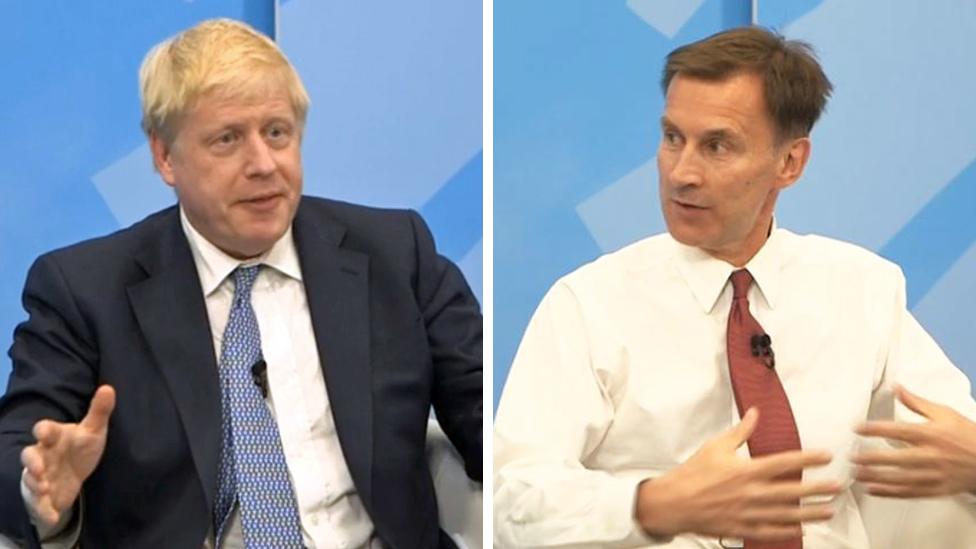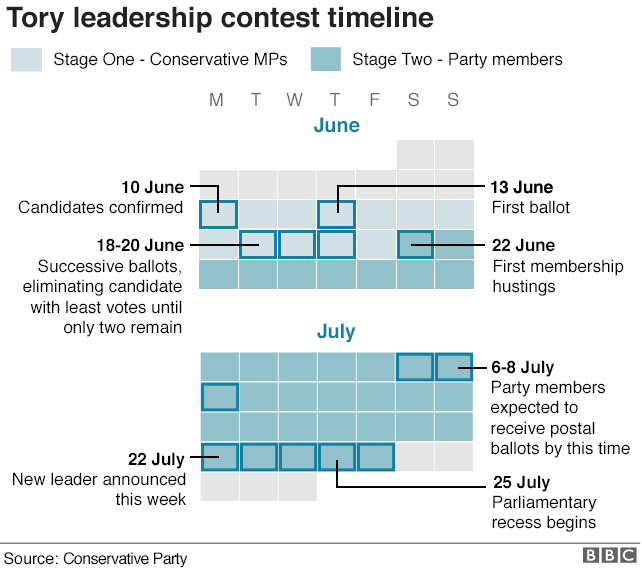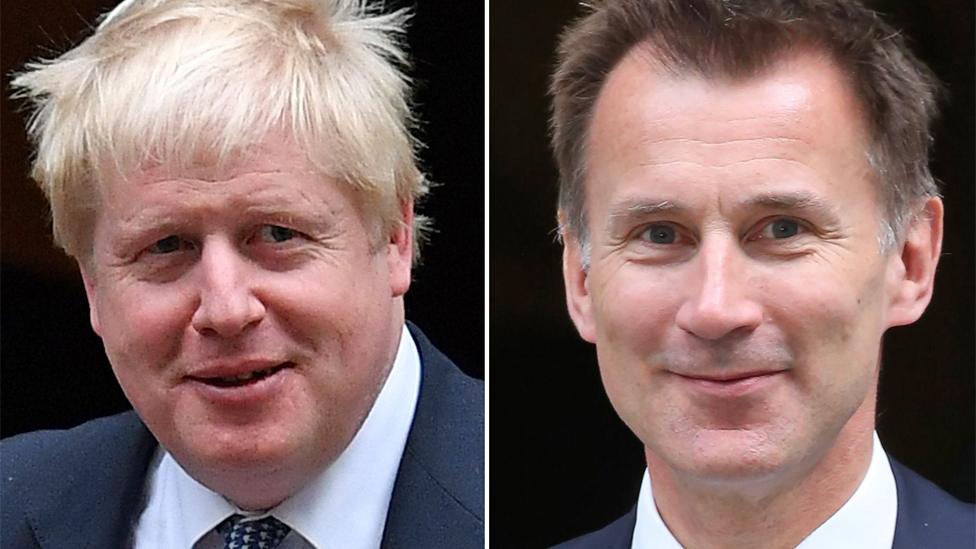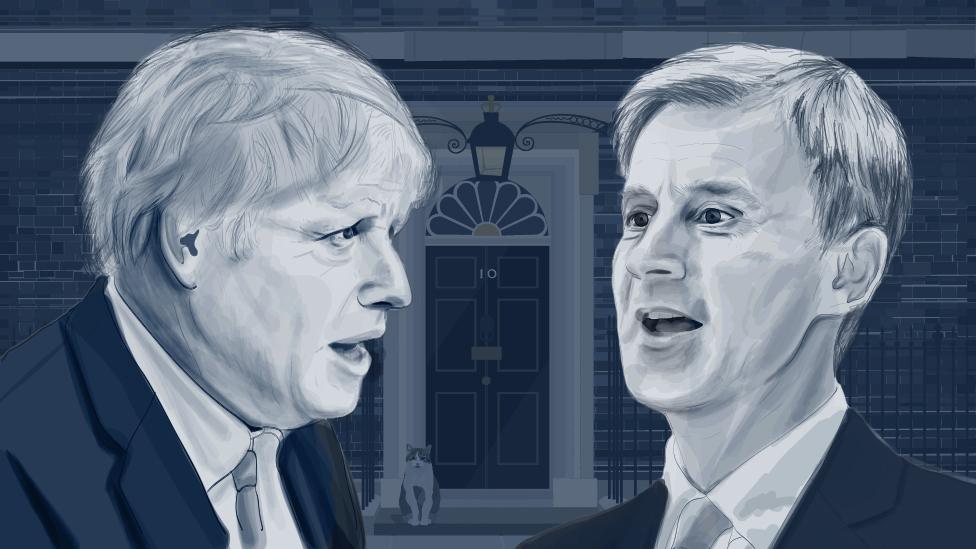Tory leadership: The ringmaster or the safe-ish pair of hands?
- Published

Smart? Intelligent? Surely, yes we would all want a clever politician in charge, someone who grasps complexity and is willing to put in the hours to solve the country's problems.
But without resorting to the insult that the inhabitants of Westminster would have been on stage and screen if only they'd been more aesthetically blessed, politics also has an element of performance about it.
It is a very serious form of showbiz if you like. Its most senior figures become famous, even if often for all the wrong reasons.
Political parties want their leaders to have "cut through", to use the terrible jargon, not just to communicate clearly, but to make people want to listen.
'Battle of ideas'
So, you'd likely want your desert island dream prime minister not just to be able to do the work, to be serious about what it takes, but to have razzmatazz to be a bit of a performer, a politician who can bring in a crowd and make them feel good.
It is a battle of ideas and how you win it is, of course, down to how convincingly and compellingly you can explain them.
So in our ideal world, (leaving the ideology out of it) it's all pretty straightforward.
The prime minister ought surely to be a man or woman who can be bothered to master vital spreadsheets, full of calculations about what to do with the country's hard earned cash, to be all over the detail of international treaties like a rash, to have original ideas about how to fix the country's problems.
But also, someone with standout charisma who can persuade, cajole, maybe even inspire.
Without offending fans of spreadsheets - and there are many of them out there who are also highly charismatic individuals - the Tory members who will choose the next prime minister don't live in that kind of nirvana.
Having spent a chunk of time this week interviewing Boris Johnson and Jeremy Hunt at length, the small electorate in this contest do not really have in front of them a candidate bathing in both mastery of policy and detail and political star quality.
And by extension, nor do the rest of us who don't have any choice at all.
First off, the spreadsheet test.
There is good reason why Mr Johnson is criticised for being cavalier about detail, that goes way beyond his terrible mistake about the Nazanin Zaghari-Ratcliffe case.
People who have worked closely with him, both fans and detractors, say that he is simply not really interested in minutiae.
Officials who worked with him tell me there were two kinds of Mr Johnson and they weren't always sure which one they were going to get, changing even on a daily basis.
Sometimes he could be utterly persuasive and on top of policy.
But on other occasions it was evident that he just hadn't bothered to absorb the information required and wouldn't focus, even complaining about the amount of material that was put in his ministerial red box.
And it's clear from talking to him at length this week the force of his arguments do not come from a profound understanding of detail.
He's happiest painting with a broad brush, even when it's not a model bus.
In full: Boris Johnson on Brexit, his character, political record and right to privacy
For his most loyal supporters that, believe it or not, simply doesn't matter.
Not just because they believe he passes the charisma test so easily, but because being a leader should be about decisions not details.
One of his backers familiar with how Mr Johnson operates makes the comparison to the captain of an enormous battleship.
They don't want or need to know which pump has broken in the engine room, which crewman has gone sick, what the exact temperature of the boilers are, but is only required to know if there is a problem that affects the performance of the vessel and if it can be fixed.
And you'll regularly hear around the place that the former foreign secretary would run his Number 10 operation as the chairman of the board, not the chief executive - the decider and figurehead, not the manager.
There's also a view in his camp that because much of the public isn't that interested in the micro detail of policy, not of course always the case, then it doesn't really matter if he isn't either.
In a funny way that means he has more in common with most of the public than proper Westminster nerds.
His many doubters though believe it is nothing short of outrageous that someone in his position has basically not always been bothered to pay proper attention.
And the objection is sometimes particularly profound because Mr Johnson is clearly very smart - it's a question of attitude, not ability.
The affable former chairman and chief whip of the Tory Party, Patrick McLoughlin, who, it should be said, is supporting Mr Johnson's rival, said today: "There were times when Boris wasn't quite on top of the brief."
Quite. Others in private speak much, much less diplomatically.
Jeremy Hunt interview in full
Mr Hunt is a very different kind of politician.
When he was in charge at the Department of Health he made cracking down on mistakes in hospitals one of his big priorities.
And on the wall in his office on Whitehall hung a weekly list of mistakes being made in every hospital in England.
It's not quite the same as Aneurin Bevan's famous words at the birth of the NHS, when he vowed that "if a hospital bedpan is dropped in a hospital corridor in Tredegar, the reverberations should echo around Whitehall".
But it is telling of a politician who will delve down into the details of a problem to get a grip on it. (At this point I can't resist telling you that Mr Johnson has a light sabre on his desk).
That doesn't mean for a second that Mr Hunt has not made political mistakes.
His record at the NHS is less shiny than he would want to admit.
With critical targets for care missed again and again, a corrosive dispute with junior doctors over their contracts, huge staff shortages.
When he was culture secretary he had an ill-fated ambition to encourage a huge expansion in local TV stations that ended with a whimper not a bang.
But those who have worked with him say that he is serious, and lo and behold, actually cares about detail and facts. (A bit trickier when it comes to his Brexit plans, but we'll come to that in a moment).
Politics though is not just about detail and facts, it's about emotion and belief.
This is where Mr Johnson's supporters believes he is in his own galaxy.
I've written many times before about how he is one of a tiny number of politicians who has a particular kind of pull on the public on the campaign trail.
Go out to observe and film him on the road, members of the public stop what they are doing, come out of their shops or homes, or put down their coffee in the café on the corner, to go to try to meet him, whether to shake his hand, ask for a selfie, or maybe just as likely, to harangue him and accuse him of everything under the sun.
He makes some people mad, but he delights others. But it is not possible to ignore him.
Mr Johnson plays on that, of course, outlining his supposed obscure hobby of painting happy passengers on a model bus yesterday, knowing fine well for every moment that members of the public were wondering what on earth he was talking about.
Sharing the bizarre clip of the video, they would be wondering about that, rather than what on earth he would do with the country.
For as long as he is "entertaining", then people aren't busy analysing perhaps.
When he creates that kind of circus, willingly or not, he is maybe the ringmaster, and not the clown.

One of the interesting things about this campaign so far is that Mr Hunt has undone some of the buttons that have been firmly in place during his long time in cabinet.
He has made jokes online, he has talked about his family and his Chinese in-laws' nicknames for him.
He has attacked Mr Johnson in a way that this politician who prides himself on being polite but tough would not have previously dared.
He's done that because he knows the best chance he has to make up the ground between him and the favourite is to push at the bruise, the questions many Tory members have about Mr Johnson's character.
But at this stage, while Mr Johnson leaps over the hurdle of the charisma test, which can repel as well as attract, Mr Hunt struggles to overcome it.
That's not because he is less charismatic than your average politician these days.
Compared to many of them, including the current prime minister, despite his serious tangles with junior doctors, Tory members would see an affable, and safe-ish pair of hands.
But if it comes down to making an impression, who is the candidate to make a splash, it is not Mr Hunt.
For all the contrasts between the two men, it is important to understand that when it comes to the biggest question they'd have to grapple with there isn't a vast cavern between them.
As we've reported all week, they clash over the Brexit deadline, but broadly, they both want to change the existing deal, and they both say they'd leave without one.
It's important to know too that both of their plans for leaving the EU are based on a lot of ifs and buts.
They also have, despite their very different characters, to most of us, remarkably similar backgrounds - public school, Oxford, then long careers in politics.
Yet the Tory party must choose, in the knowledge they don't have a candidate in front of them who passes all the hypothetical tests.
I've written before, and will no doubt write again - never underestimate Mr Johnson's capacity to implode.
It's also worth noting that Mr Hunt is by the day opening up to make his pitch more compelling.
But despite the drama that seems to follow Mr Johnson around, after a largely miserable three years of knocking lumps out of each other, right now, the Tory party looks set to choose the feel good over the facts.
What would you like the prime minister to be?
Experienced? Well, of course, no-one would want an amateur in charge, someone with no idea how Westminster works.
Authoritative? Ideally.
The public would indeed expect that the person talking on the country's behalf in Parliament and around the world has gravitas, that when he or she speaks, you'd want the rest of the world to pay attention without worrying about what mess they might blunder into.
Doesn't sound too much to ask.
- Published20 June 2019

- Published18 July 2019

